- Home
- Debra Dunbar
Unholy Pleasures (Half-breed Series Book 4) Page 15
Unholy Pleasures (Half-breed Series Book 4) Read online
Page 15
Sandy shot Matthieu a narrowed glance, stabbing at her planner with a pencil. “Huge corporate retreat tasting and presentation in an hour, Matthieu. Don’t be late.”
He eyed me. “I’ll be back in half an hour, tops.”
It should have been embarrassing having her and everyone else who saw us, know exactly what we were going to be doing down in the cellars as well as the fact that Matthieu was thinking he’d have me done-and-gone in half an hour, but I didn’t care. The employees here probably already thought me some kind of slut after having seen me now with Kai, Harkel, and Irix. Might as well give them something else to talk about.
Matthieu led me through the store much as Sean had at Boone Valley, pointing out which wines were their specialties, and what awards they’d won. Unlike the neighboring vineyard, DiMarche used a greater variety of grapes including Semillon and Gewurztraminer, some of which we weren’t able to grow in our Napa Valley climate as efficiently as other locales. I knew Jorge took a lot of pride in our Chardonnay and Riesling grapes as well as our Syrah, but it was interesting to see the final products of those grapes and what seemed to be the more successful and acclaimed wines produced at DiMarche.
Then we went through a huge set of doors to a chilled area with cases stacked on pallets, then down a set of stairs into the darkness. Matthieu took my hand, stairs creaking under our feet as we descended into the cool air of the cellar. At the bottom, Matthieu flipped a switch and the whole area was bathed in a low golden light.
“It’s important to keep it dim down here. No sunlight. No vibration from people walking around or trucks coming and going. Temperature is kept a constant fifty-five degrees. We make sure it never fluctuates more than two or three degrees from that setting. There are humidifiers throughout the cellar to keep the humidity at seventy to seventy-five percent.”
“So the corks don’t dry out, shrink, and allow air and bacteria into the wine bottles,” I added.
He nodded. “The advent of synthetic corks has meant that dryness is less of an issue than it used to be, but we still like to keep it constant. Besides, we occasionally will use natural cork if we’ve got a truly special reserve batch that we’re aging.”
Matthieu walked over and pulled a few bottles from a shelf, wiping them with a rag and peering at the labels. Then he set them on a tall wooden bench and reached underneath to pull out a box. Inside were a variety of glasses and a corkscrew. It made me wonder how often he came down here to re-stock his glasses. Was this “tour” just for attractive female employees, or did he occasionally offer his special services to tasting room patrons? It worked to my advantage if he was getting it on with the customers, but I was curious about the logistics.
“The first one we have here is our 2011 Estate Merlot. All wines list their appellation on the label—whether the grapes are all grown in California, or California and Argentina, etc. A wine needs to have at least seventy-five percent of the grapes grown in Napa Valley to use that specific identifier, and estate wines mean all the grapes that go into the wine are grown on the winery’s vineyards. So this bottle I’m about to open was produced using Merlot grapes from our own fields.”
It was cool thinking that the vines I’d been working with the last two weeks had gone into what Matthieu was pouring.
“Didn’t the California Merlot market crash in 2004 in favor of Pinot Noir?” I asked, taking a glass and eyeing the deep red-purple liquid in the low light. I tended to steer toward Syrah wines and Pinot Grigio and couldn’t recall the last time I’d had a Merlot.
“Trends come and go, but there are always fans that continue to like certain wines. It might not be the gold-rush it was fifteen years ago, but there’s still a market for high quality Merlot.”
We chatted about cabs and red zin and how sweet wines were making a comeback—and not just as dessert wines either. California had once been famous for their Riesling, only to shift to Chardonnay once that style went out of favor. Matthieu was predicting a comeback of crisp, clear, sweet wines, and I was totally on board with that.
I was also seeing the man in a different light. He was an unrepentant player, but he wasn’t creepy. I got the feeling that if I’d said no or acted uninterested, he wouldn’t have pushed it.
“What do you think about the elf, Hallwyn?” I asked, wondering if he’d tried to hit on her and choking back a laugh at the thought.
He blinked in surprise at the change of topic. “I really don’t know. I mean, I don’t get too involved in the day-to-day stuff in the field. It’s not my area of expertise. I know Jorge has been ready to pull his hair out this year. I haven’t heard anything positive or negative about her work.”
That wasn’t quite what I was getting at. “No, I mean what do you think of her knowledge of wine? Elves are supposed to be experts there, too.”
“Well, I’m not fearing for my job, if that’s what you mean.” He scowled down into his wine glass. “She doesn’t understand our varietals, or our processes. She doesn’t like our food. She doesn’t like our wine. She doesn’t seem to like humans, whether it’s a business relationship…or more.”
Ah, cold shoulder from the elf. Not surprising. But the rest was. “How could she not like our wine? Yeah, a lot of what DiMarche produces isn’t high-end, but we do have our estate and specialty wines.”
He nodded. “This Merlot we’re drinking retails for twenty-three a bottle. Not rich-man stuff, but not something an elf should turn her nose up at.”
Matthieu nodded and I followed his lead, swirling the wine, looking at how it coated the inside of the glass. We buried our noses into the glasses, inhaling the aroma, then swirling it once more before sampling a mouthful. This ritual was new to me. In college, we were drinking box wine out of whatever cheap glasses we could find. There was no letting the wine rest or aerate. There was no savoring the bouquet. Even if we weren’t partying it up, and the wine was for a dinner with friends, we were just drinking it.
But this wine was worth savoring. And it was well worth twenty-three dollars. I made a note to hint to friends and family that I might like some of this for my birthday. Did Irix have a wine cellar in New Orleans? Given the high water table there, I doubted he even had a cellar. Maybe an above-ground one?
“Red plum and black cherry flavors with a slight tobacco note,” Matthieu was saying. “Not peppery like the cabs, and not as earthy as the Pinot Noir, but rich and lush. A quality Merlot should be fruity and complex with smooth tannins and an easy, soft finish.”
“And it’s been aged for how many years?” 2011. Sheesh, I’d never be able to wait that long before drinking something.
“Actually it’s oak barrel aged for twenty-four months, but this was a particularly good year and an award winner, so we’re keeping it as long as we can.”
I nodded, still thinking this stuff would have been gone within a year of bottling at my house. “So twenty-four months aged to reduce the tannin bite? And oak? I don’t taste oak like I do with our chardonnay.”
He grinned. “You’re good. You’ve got a better palate than that snobby elf. In this wine, the oak barrel aging is less about the tannins and more about giving the wine a more solid structure. Merlot in this region is more fruit-forward. It’s an interesting wine. Grapes from colder climates like Chile are more structured with higher tannin off the vine. They’re often similar to Cabernet Sauvignon grapes. In a warmer climate like Napa Valley, the grapes have a different flavor, and the use of oak barrels in aging helps give the wine a more cab-like body.”
I was fascinated, and I was suddenly drawing exciting parallels between those beloved vines in the field and this amazing wine in my hand.
“Merlot grapes are thin-skinned and fragile,” I commented. “They ripen earlier than the cab grapes and you’ve got to time the harvest perfectly because a heavy rain is going to mean choosing between over-ripe grapes or ones swollen and diluted in flavor. Plus, it’s important to trim back a significant portion of the vine so the grapes don’t get a w
oody or grassy taste, but over-trim and too much direct sun will burst your grapes and ruin a big portion of your harvest.”
He tilted his head. “See? I didn’t know that. I knew they were thin-skinned grapes and the dangers of getting a grassy, off-flavor, but not about how sensitive they are to direct sunlight.”
“The more you know…” I teased, taking another sip.
“Indeed.”
Even though I was down here on this tour for about the same thing he was, I could tell that he was enjoying the fact that I actually appreciated wine and did more than nod politely as he discussed his favorite subject.
We moved on to a sweet red, and by the time I’d finished my next glass I was feeling tipsy and ready to rip some clothes off Matthieu. Didn’t he have a big tasting like now? Darn this might end up being quicker than I’d hoped. As much as I wanted to be thorough with Matthieu, I didn’t want him getting fired. Maybe I’d need to make an exception and give the guy a round two tomorrow after work to make up for what was likely to be a quickie here.
And, as much as I liked sex and wanted to get it on with this guy, all the wine stuff was cool. Matthieu was a font of information, and in less than an hour I’d gone from just liking wine in general to being able to detect differences in the subtle flavors and textures. I was a half-elf. Could I train myself to dive down into the grapes behind the wine and determine the varieties and growing conditions just from one sip? That would be cool, but I’d need more than my elf-senses, I’d need training.
“How do you get to be a sommelier? I’m a botany major, and my future is pretty much going to be in the fields, either with a vineyard or studying the wetlands along the Gulf, but I’m curious.” I was more than curious. It might never be a career, but this could be an amazing hobby.
“You may not have the ability to pair food and beverages to the extent needed to be a professional sommelier, but it’s still something you should study. And I think you might find your calling as an enologist.”
“A what?” I sipped the wine, wondering if this was part of his seduction routine.
“Enologist. They’re the ones who work with the raw grapes to determine exactly the type of wines a winery should make from that harvest. Knowing the flavor profiles and how small changes in temperature, soil, and rainfall can affect the wine leads to better decisions in the field, which is critical in that job. It’s one thing to be skilled at agriculture, but to also be a bit of a chemist, a bit of a connoisseur, and to wrap all that together to make decisions about the fruit growth and harvest is to be an enologist. And if you’re good, then you’ll be in demand by the top vineyards. You may not be able to control the weather, but if you understand what qualities your harvest is likely to have, and are able to guide the winery in their product decisions and strategy, your skills and knowledge would be invaluable.”
I’d made the mistake of assuming Matthieu was just a pretty face. And I might not be able to manipulate weather, but there were elves who could. And my palate was far more sensitive than this man would ever know.
“So is there an enologist class I take? Is it an apprenticeship? What chance would I have of getting into such a thing as a recent grad with a botany degree?”
What was I thinking? Wetlands with Jordan. That was my future. Yet suddenly my mind was filled with visions of producing the perfect wine, of carefully guiding the process from vine to bottle to ensure the release of a product that rivaled the elixirs of the gods.
He hesitated. “Most usually start with basic wine classes at a local restaurant or winery, or even continuing education classes at a community college. Read. Enjoy. Take notes and study and go to as many tastings as possible. Always ask questions. Work with other enologists, production staff, and vineyard managers. It’s a long learning curve.”
I took the glass he’d handed me and swirled it, eyeing the thick sheen of light gold coating the sides of the goblet and streaking in the broad lines he’d called “legs”.
“Tell me what you think,” he urged.
“A lot of residual sugar,” I noted, then buried my nose in the top of the glass. “Crisp and clear. Sharp like a knife at the onset, then cold apples and honey. And magnolia.”
He nodded, his face impassive as I took a sip. And made a horrible face.
“I thought it was an ice-wine, but it’s too sweet. And there’s a weird musty taste at the finish, like someone wrapped cotton candy in an old sock and stuck it in a hot attic for a few months.”
He laughed, then pulled out the bottle and showed me the label. I recognized it from my youth. It was that fruity-sweet stuff that was every teenager’s first alcoholic beverage. Well, every teenager except me. Yuck.
I rubbed my tongue on my shirt sleeve trying to get the taste out of my mouth. “Why do you even have that down here? That’s got to be a contaminant for all the decent wines.”
“Because sometimes I bring a pretty woman down here and want to see if she really knows anything about wine or is just reciting what she read in the brochures. They might be a bit more circumspect in their description than you were, but the real wine lovers can’t keep from making a face.”
“And the ones who don’t?” I wondered if this was his screening criteria, if only the ones who made the cut got shagged behind the casks? From Matthieu’s reputation, I figured he screwed every woman he brought down here.
He shrugged. “I just don’t have much conversation with those who don’t.”
Ah. Wine smart got a bit of a chat before fucking, where they others were bang-and-go. I was so not going to regret this.
“How much conversation?” I made my voice husky and low. “Because as much as I enjoy discussing wine, there are other pleasures.”
That ended all discussion. Matthieu removed my wine glass from my hand and moved in for the action. He was skilled, his fantasies pretty straightforward. Sex with him was fun. Safe. He didn’t sprout claws, or come at me with something that looked like it should be attached to a much larger mammal. Afterwards he reached over behind me head and pulled another bottle from the shelf.
“I don’t usually get into this one, but I think you might enjoy it.
With a quick kiss, he got up to open the bottle, sitting back down beside me after he’d poured the wine. We were naked, sprawled against the casks. He handed me a glass, then gently tapped the edge of mine with his own. I sipped and smiled, realizing that this time Matthieu hadn’t given me the nasty teenager crap.
“Blackberry. Hickory. Hint of dark chocolate in the midnotes,” I mused. “Not bitter, but rich and deep.”
His hand touched my leg, fingers skirting up my inner thigh. “I want to recommend you to a contest put on by the Italian Enology Association. This year it’s at a vineyard outside of Bergamo—about thirty miles northeast of Milan. There are classes and tastings, and a lucky few will receive an offer to apprentice with the biggest houses in Europe. It’s where I got my big break. I think I can get you in. If you really are interested in becoming an enologist, it’s a great way to get the knowledge and experience needed to break into the field.”
Oh wow. “Is that because I just fucked your brains out?” I teased.
His fingers reached the apex of my thighs, gently exploring. I saw him stir and wondered if he had another condom. Not that he needed condoms with me.
“It’s because you’re brilliant and a natural at this. I’ve never met anyone with your ability. That plus your understanding of varietals, genetic modifications, pests and diseases…all that and you’re probably barely in your twenties. You’re better than that elf Richard hired. It’s like you’re the supernatural and she’s some imposter. If you’re this good at your age, what will you be at thirty or forty? I can’t stand the thought of your talents going to waste.”
Hallwyn wasn’t an imposter, I was just beginning to think she’d lied about her abilities and was in way over her head. Other than that, Matthieu was pretty close to hitting the mark.
“And your other talents
are pretty otherworldly as well.” He leaned over and kissed me, his tongue brushing my lips as he pulled back. “I’m normally a one-time only guy, but one taste of you and I’m completely addicted.”
Yep. No surprise there. What was a surprise, though, was that I was on board for a repeat. I guess it was the wine and the novelty of combining two of my favorite things. And his flattering comments probably had as much to do with my interest as anything. Hey, what girl doesn’t like being called brilliant?
“I’m normally a one-time only gal as well, except when it comes to a select few.” I took a sip of wine, eyeing him over the glass. “Occasionally something is so tasty that I’ll decide to have a second glass.”
“Tomorrow?” he murmured.
I smiled. “Tomorrow.”
We dressed and cleaned up the glasses and wine bottles Matthieu and I came out of the cellar to a crowd of people. It seems the tasting room was in full swing with several groups of people milling about eating cheese on little toothpicks and holding empty glasses of wine.
Oops. Matthieu was late—very late. I’d clocked out, but he clearly was expected to host this shindig, and the woman running the tour looked rather frazzled.
“Hey, I grabbed his hand before he dashed off to talk wine and flirt with the patrons. “Do you know anything about what’s going on over at Boone Valley? Are they having the same struggles in the field as we are, or did we just get hit with the unlucky stick?”
He sniffed. “We’re worse off than they are, but they’ve got issues. It’s why the hired that elf woman. She’s no miracle worker, though. If she can’t turn things around faster than she’s doing, they’re going to have to buy most of their grapes this year.”
Which would kill profits as well as limit what wines they could produce under an estate label.
“The weird thing? The small boutique vineyards aren’t affected. Same with farms. McMillian and Sons Orchard was looking at bankruptcy before they hired their elf, but Tom Henry’s place right next to them didn’t have so much as a brown spot on their apples.”

 Ship of the Dead: The Templar Series
Ship of the Dead: The Templar Series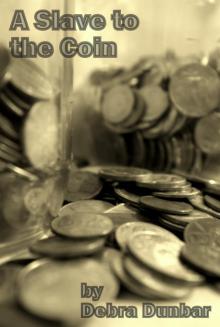 A Slave To The Coin
A Slave To The Coin Royal Blood
Royal Blood A Demon Bound
A Demon Bound Clip Joint
Clip Joint California Demon
California Demon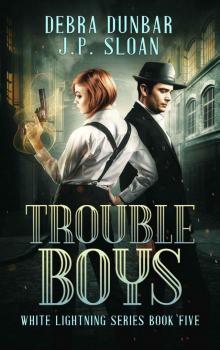 Trouble Boys (White Lightning Book 5)
Trouble Boys (White Lightning Book 5) Royal Blood: Templar Series, Book 5
Royal Blood: Templar Series, Book 5 Down the Chimney
Down the Chimney Juneau to Kenai
Juneau to Kenai Queen of the Damned
Queen of the Damned Stolen Souls
Stolen Souls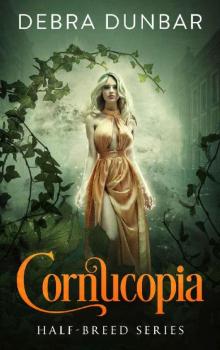 Cornucopia
Cornucopia A Suburban Summoning
A Suburban Summoning Devil's Paw (Imp Book 4)
Devil's Paw (Imp Book 4) Angel of Chaos
Angel of Chaos Satan's Sword
Satan's Sword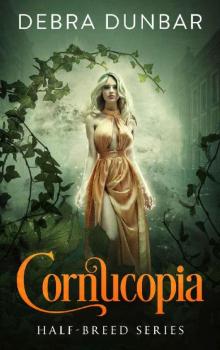 Cornucopia (Half-Breed Book 3)
Cornucopia (Half-Breed Book 3) Imp Forsaken
Imp Forsaken Northern Lights
Northern Lights City of Lust (Half-breed Book 5)
City of Lust (Half-breed Book 5) A Suburban Summoning: An Imp Series Story
A Suburban Summoning: An Imp Series Story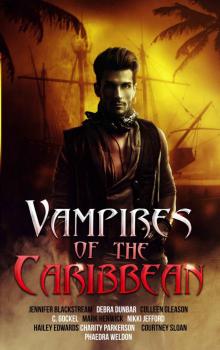 Vampires of the Caribbean
Vampires of the Caribbean City of Lust
City of Lust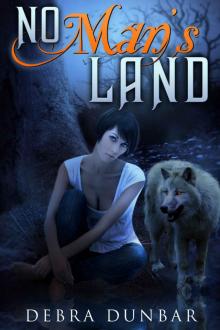 No Man's Land: An Imp World Novel
No Man's Land: An Imp World Novel Three Wishes
Three Wishes Juneau to Kenai: An Imp World Novella (Northern Wolves Book 1)
Juneau to Kenai: An Imp World Novella (Northern Wolves Book 1)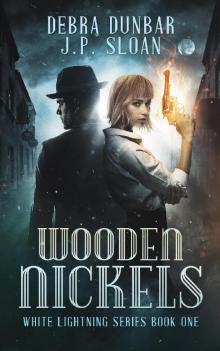 Wooden Nickels: White Lightning Series, Book 1
Wooden Nickels: White Lightning Series, Book 1 Last Breath
Last Breath Kingdom of Lies (Imp Series Book 7)
Kingdom of Lies (Imp Series Book 7) Unholy Pleasures (Half-breed Series Book 4)
Unholy Pleasures (Half-breed Series Book 4) Ten Lows A-Leaping: An Imp World Story
Ten Lows A-Leaping: An Imp World Story Far From Center
Far From Center Ten Lows A_Leaping
Ten Lows A_Leaping Bare Bones
Bare Bones Kingdom of Lies
Kingdom of Lies The Morning Star
The Morning Star Penance_An Imp World Novel
Penance_An Imp World Novel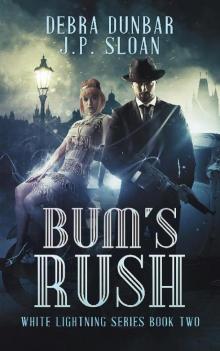 Bum’s Rush: White Lightning Series, Book 2
Bum’s Rush: White Lightning Series, Book 2 Bad Seed: An Imp World Novel (Northern Wolves Book 4)
Bad Seed: An Imp World Novel (Northern Wolves Book 4) Winter Fae
Winter Fae Winter Fae: An Imp World Novel (Northern Wolves Book 3)
Winter Fae: An Imp World Novel (Northern Wolves Book 3)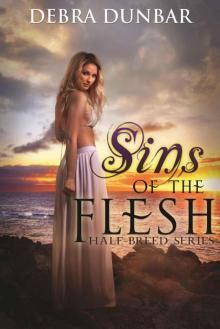 Sins of the Flesh (Half-Breed Series Book 2)
Sins of the Flesh (Half-Breed Series Book 2) Devil's Paw
Devil's Paw Rogue: An Imp World Novella (Northern Wolves Book 2)
Rogue: An Imp World Novella (Northern Wolves Book 2) Satan's Sword (Imp Book 2)
Satan's Sword (Imp Book 2) Exodus (Imp Series Book 8)
Exodus (Imp Series Book 8) Famine's Feast (The Templar Book 4)
Famine's Feast (The Templar Book 4) Liberation
Liberation Dead Rising
Dead Rising Far From Center: An Imp World Novel
Far From Center: An Imp World Novel Imp Forsaken (Imp Book 5)
Imp Forsaken (Imp Book 5) Angel of Chaos (Imp Book 6)
Angel of Chaos (Imp Book 6)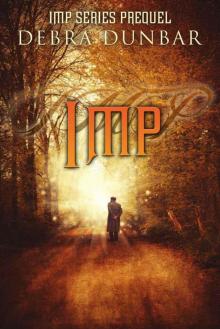 Imp
Imp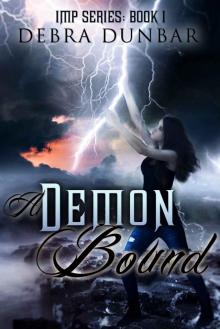 A Demon Bound (Imp Book 1)
A Demon Bound (Imp Book 1) Queen of the Damned (Imp Series Book 9)
Queen of the Damned (Imp Series Book 9)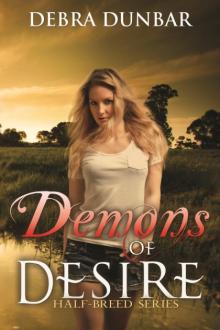 Demons of Desire
Demons of Desire